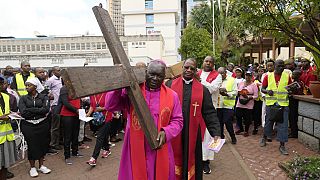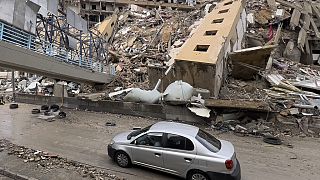Rwanda
Patmos church in Rwanda’s capital, Kigali holds two services everyday – the more popular session is the afternoon miracle service.
Self-titled prophet and founder of the church, Jean Bosco Nsabimana promises to deliver his congregants from any problem including illness, poverty, missed opportunities and even “demons”.
With a following of around 2,000 people across Rwanda, Patmos Church is among a few churches in Kigali that were not closed in a recent government clamp down on illegal places of worship.
Authorities said the move to tighten rules on registration of churches was aimed at stemming fraud.
Since the beginning of the year, the government has shut thousands of churches and around 100 mosques; saying that they failed to comply with building regulations and noise pollution standards.
Despite concern over the widespread closures, Nsabimana says the move will provide more transparency.
“The closure of churches didn’t stop our collaboration with the government, we recognize that they were a little forceful in the closures of churches, but on the other hand, it has also forced churches to comply and ensure that they build adequate structures, which is also something that is good for the country and gives the country a good look,” he said.
The shutdown measures mainly targeted small Pentecostal prayer houses run by charismatic preachers who often draw followers with promises of miracles.
Rwanda’s government also accuses these preachers of taking advantage of vulnerable people to grow rich.
But Nsabimana says many of the closed churches are likely to spring up again.
Most churches may not be able to meet the new requirements set by the government that stipulate that churches will need to be build on at least half a hectare of land.
“It will not be possible to reduce the number of churches. Why haven’t they done the same with all the bars, and look at all the night-clubs around, why haven’t they closed all of them? For example, they are saying that in order for new churches to be set up, they need to have at least access to half a hectare of land? How is that going to be possible in a country like Rwanda where there is lack of land. They say there are 2,000 churches in Kigali alone, where will all those churches get land to set up? It’s impossible,” he added.
The majority of Rwanda’s 12 million people are Christian while Muslims make up around 5 percent.
Before the current crackdown places if worship, the government earlier this year also banned mosques in the capital from using loudspeakers during the call to prayer.
Shaswari Nshimiyimana is Rwanda’s Islamic Association Vice-Mufti.
“I think that it is better for our authorities to think about this crackdown again and find a compromise for us to use the mosques, and work around the harsh conditions,” he said.
Activists say the regulation violates freedom of expression and religious rights.
But the government has defended the move saying the churches were not officially recognised and engage in “unhealthy and indecent” practices.
The crackdown also coincides with a review of a law regulating the operations of faith-based organisations.
According to a proposed new law, all preachers must have theological training before opening a church, and religious communities are expected to meet standards in terms of infrastructure, safety and hygiene.
In the capital Kigali, reaction to the government directive has been varied.
“I agree with the government about the closure of churches because there were too many churches, more than you would imagine in Rwanda, and they would teach unclear things. Many things happened in these prayer rooms, where a prophecy could come and separate a wife from her husband yet they have children. Or a prophecy comes from God saying that one is not meant for his/her partner and they divorce. I appreciate this campaign it is a good thing that government managed to close these churches,” said Kigali resident, Maurice Shabani.
“I think having many churches all over is a good thing. It helps manage time, so we don’t have to go too far to find a church. The authorities must know that flesh and spiritual life go together, they must be in harmony. You cannot tell someone to lead a full life when he has no income or without the church. It will be difficult. The government needs to know that our spiritual life is important if it wants peace with us,” said Chantal Mukaneza, another Kigali resident.
According to official figures, there are over 15,000 churches in Rwanda, of which only 700 are registered.
Officials say the revised law is expected to come into effect in June.
Reuters











11:05
Africa's hight cost of climate change [Business Africa]
00:55
Algerian-French writer Kamel Daoud wins top French literary prize
01:00
DRC: M23 rebels seize new town near border with Uganda as talks drag
01:51
Meet the churches welcoming migrants across the world and championing diversity
Go to video
Paris court sentences ex-Rwandan doctor to 27 years for 1994 genocide role
01:09
Congolese army announce they have taken back control of DRC's Kalembe, M23 rebels deny